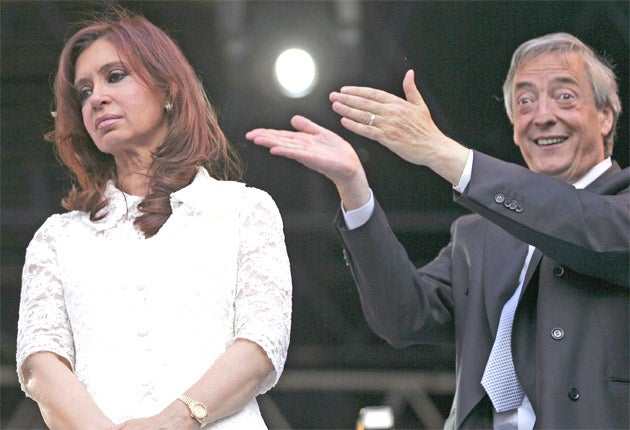Argentina is coming to terms with the loss of its most influential political spouse since the days of Eva Peron following the sudden death of Nestor Kirchner, the former president and husband of the country's current leader, Cristina Fernández de Kirchner.
State television reported that Mr Kirchner suffered multiple heart attacks yesterday morning at his home in Calafate, Patagonia, while waiting to take part in a national census. He was 60 years old and had recently undergone major cardiac surgery.
News of his death leaves a question mark over the country's political future, since Mr Kirchner was expected to contest next year's presidential elections and would have been a favourite.
It also represents a major blow to Cristina, who has lost not just her husband of nearly 40 years and father of her two children, but also her closest adviser. "It was a sudden death, there will be an official medical report," said the couple's doctor, Luis Buonomo.
Mr Kirchner, a left-leaning member of the ruling Peronist party, served as Argentina's premier from 2003 to 2007, but instead of contesting a second period in office, stood down to allow his wife to run for President.
Since then, he had maintained a high profile as both a powerful congressman and an important economic adviser to his wife, leading to them being compared in some quarters to Bill and Hillary Clinton. At the time of his death, he was Secretary-General of the Union of South American Nations.
"A formidable fighter has left us," was how one of Kirchner's allies in the Peronist party, Felipe Solá, put it. "He was a one-in-a-million person. I think he was one of the most-important politicians of the last 40 or 50 years. History will remember him."
Mr Kirchner, a former lawyer and governor of Santa Cruz, a barren province of Patagonia, came from a modest background and was a surprise victor when he won the 2003 Presidential elections, with a little over 20 per cent of the popular vote.
He was fond of saying that he took power at a time when Argentina was in "hell". The country defaulted on $95bn in foreign loans in 2001, and had since gone through three presidents. Unemployment was at a record high of around 20 per cent. Soon after taking office, Kirchner told the International Monetary Fund that Argentina could only afford to give its creditors 35 cents back for every dollar they were owed. Against many observers' predictions, the IMF restructured the debt.
"His message was that creditors should actually expect to get nothing back, because they had bought risky bonds from Argentina, and those bonds had high returns to reflect that risk," said Manuel Abdala, an economist and expert on Latin America for the consulting firm LECG. "It was a very courageous and innovative piece of negotiation."
With its debt restructured, the country duly enjoyed high rates of growth in the ensuing six years. It also survived the 2008 recession largely intact, though suffered from high inflation in the past couple of years. "What he did was quite historic," said Mark Weisbrot, an analyst at the Centre for Economic and Policy Research in Washington yesterday. "I often compare him to Roosevelt in the Great Depresion: there was comparable unemployment and lost output, and he took on the most powerful interests in the world and the economics profession, and won."
During his presidency, Kirchner also reformed the judiciary and armed forces, and paved the way for dozens of trials involving people accused of human rights abuses during the military dictatorship from 1976 to 1983.
He adopted a hostile tone towards overseas interests, tearing up contracts with some foreign utilities firms, and refusing to speak with the US Ambassador to Buenos Aires for almost four years. He also sought to revive Argentina's claim for sovereignty of the Falklands.
Those leftist moves gave him a close relationship with Latin American leaders such as Evo Morales of Bolivia and Hugo Chavez of Venezuela, with whom he shared an authoritative style and refusal to kowtow to big business and the country's traditional ruling class.
Mr Chavez responded to news of his death by sending a message to his wife on Twitter: "Oh, my dear Cristina ... So much pain! What a great loss Argentina and America are suffering! Kirchner forever!"
Until yesterday, there had been widespread speculation that the Kirchners hoped to alternate their two allotted terms each as President, which could in theory have allowed them to hold power until 2019.
Yesterday's events leave Mrs Kirchner with some big decisions to make. There is now precious little time for her to decide whether to run for a second term in office next year.

Join our commenting forum
Join thought-provoking conversations, follow other Independent readers and see their replies
Comments